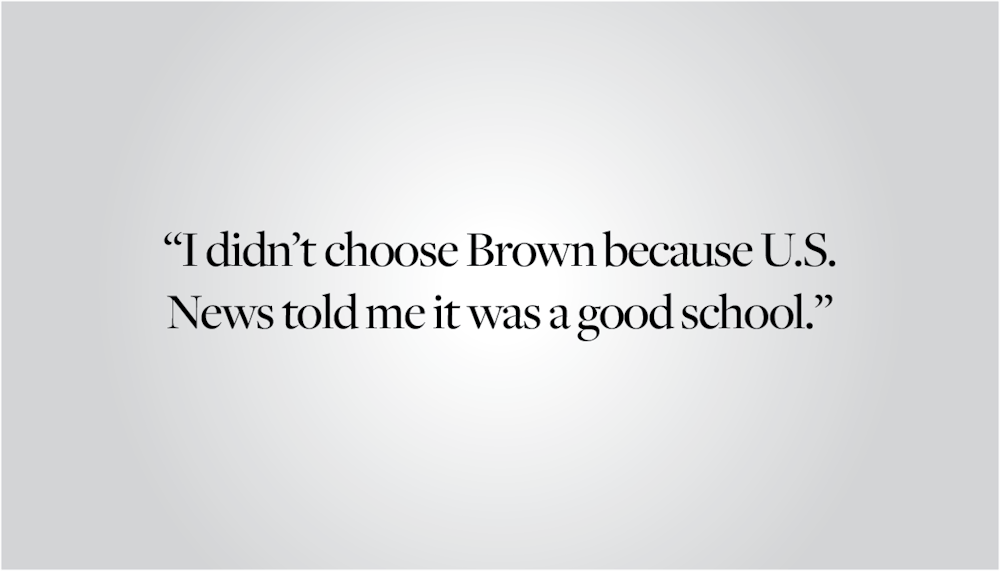In its 2024 annual college ranking, U.S. News and World Report ranked Brown ninth — tied with Northwestern University and Johns Hopkins University — among American universities, up from 13th the previous year. In contrast, the Wall Street Journal ranked Brown #67 on its 2024 Best Colleges list, a significant drop from 5th the preceding year after the publication changed its methodology to focus more heavily on graduation rates and post-graduation salaries. These fluctuations occur despite the lack of meaningful year-to-year changes in the academic quality or resources of Brown and its peer institutions. And therein lies the problem. The idea of creating an objective one-size-fits-all measure of quality is a flawed enterprise that commodifies college and distorts the value of higher education. The Herald’s Editorial Page Board recently called for Brown to withdraw its participation in this flawed ranking system. But the University isn’t the only one with this responsibility. Instead of just waiting for universities to leave this outdated system behind, every student should take shaping their application process into their own hands and deemphasize college rankings for themselves.
While seemingly benign, our national obsession with rank has created perverse incentives that affect the standard of education students receive. Colleges know that anxious students view rankings as a benchmark for quality and, as a result, have worked to game the system. The rankings overwhelmingly rely on self-reported data, which several institutions have falsified. Even more concerning is that, in a world in which rankings are falsely equated with quality, schools change their behavior to fit the year’s methodology and find all sorts of ways to work the numbers to their advantage and to students’ detriment.
What rankings fail to contextualize is that schools like Brown (#9 in the U.S. News and World Report ranking) and the Massachusetts Institute of Technology (#2) serve very different purposes from, say, Michigan State University (#60) or Wayne State University (#201) in Detroit, Michigan. Brown is a midsize research university with a focus on undergraduate education, and MIT is a research institution first and foremost. On the other hand, Wayne State University, where half of students come from the bottom 60% of the income distribution, and Michigan State University, where roughly one-fifth of students are first-generation college students, are true engines of social mobility and economic development in Michigan. In an opinion piece in The Chronicle of Higher Education, Miguel Cardona, the secretary of education, argues that “too many institutions spend enormous resources to climb college rankings and compete for the most affluent, highest-scoring students.” Instead, Cardona writes, the focus should be on “equity, inclusivity and real upward mobility” for all students. I couldn’t agree more.
Due to the use of the peer assessment system employed by U.S. News, rankings are a self-fulfilling prophecy where reputation drives rankings and rankings drive reputation. As former Pennsylvania State University President Graham Spanier lamented, a ranking “more than anything else is a measure of wealth.” In this case, it’s incredibly difficult to imagine how a public institution that serves a diverse student population can compete against an Ivy League university where more students hail from the top 1% than the bottom 60%. And the focus on the most prestigious, selective schools is unwarranted when 84% of college students attend institutions that admit more than half their applicants.
By obsessing over a select few schools, students create unrealistic expectations for themselves and ignore what a “good fit” really means. While there are meaningful differences in resources offered by universities, a linear system of rankings that definitively states, for example, that Cornell is better than Dartmouth is not productive. Students should instead look to other places, such as the Department of Education’s College Scorecard or College Navigator, to learn about what specific resources colleges have to offer and try to let go of preconceived ideas about what is “the best.”
Rankings also contribute to an immense culture of stress among prospective applicants. For parents, ready-made hierarchies exacerbate social comparison. In an extreme case, they led to the situation seen in the 2019 college admissions scandal in which wealthy celebrities and executives engaged in an elaborate bribery scheme to cheat their already privileged kids into some of the nation’s most selective universities.
The choice of if and where to attend college is one of the biggest decisions a young person can make in their lifetime. Instead of using rankings as a cheap substitute for thoughtful decision-making, we ought to consider factors such as degree options, location, student life, resources, class size and critically, cost. I didn’t choose Brown because U.S. News told me it was a good school. I chose Brown because of its unique academic programs, campus vibe and strong financial aid. It disappoints me that so many of my peers are so excited about an arbitrary increase in rank when, in reality, we are still the same Brown that we were last year.
As Columbia’s former President Lee Bollinger said in 2003, “rankings give a false sense of the world and an inauthentic view of what a college education really is.” High schoolers applying to college might have the largest role to play in ignoring rankings, but we as college students must also do our part to stop the obsession with rankings. Let’s stop looking at them, let’s stop talking about them and most importantly, let’s demand that Brown stops participating in this lousy system altogether.
Tas Rahman ’26 can be reached at tasawwar_rahman@brown.edu. Please send responses to this opinion to letters@browndailyherald.com and other op-eds to opinions@browndailyherald.com.

Tas Rahman is an Opinion Editor and a member of the Editorial Page Board. He hails from Detroit, Michigan and is concentrating in Computational Biology and Judaic Studies. In his free time, you can find Tas hiking and reading the Atlantic (alongside the Herald).





